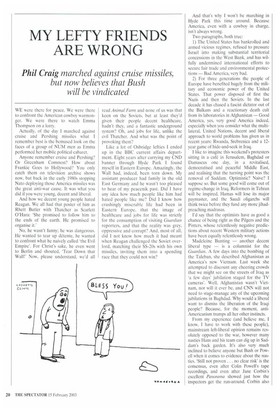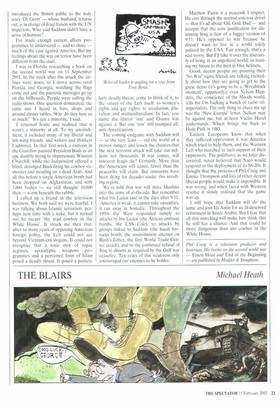MY LEFTY FRIENDS ARE WRONG
Phil Craig marched against cruise missiles,
but now believes that Bush will be vindicated
WE were there for peace. We were there to confront the American cowboy warmonger. We were there to watch Emma Thompson on a lorry.
Actually, of the day I marched against cruise and Pershing missiles what I remember best is the bemused look on the faces of a group of NUM men as Emma performed her mobile political cabaret.
Anyone remember cruise and Pershing? Or Greenham Common? How about Frankie Goes to Hollywood? You only catch them on television archive shows now, but back in the early 1980s stopping Nato deploying those America missiles was the great anti-war cause. It was what you did if you were young, decent and liberal.
And how we decent young people hated Reagan. We all had that poster of him as Rhett Butler with Thatcher as Scarlett O'Hara: 'She promised to follow him to the ends of the earth. He promised to organise it.'
No, he wasn't funny: he was dangerous. He wanted to tear up détente, he wanted to confront what he naively called 'the Evil Empire'. For Christ's sake, he even went to Berlin and shouted, 'Tear Down that Wall!' Now, please understand, we'd all read Animal Farm and none of us was that keen on the Soviets, but at least they'd given their people decent healthcare, hadn't they, and a fantastic underground system? Oh, and jobs for life, unlike the evil Thatcher. And what was the point of provoking them?
Like a lot of Oxbridge lefties I ended up in the BBC current affairs department. Eight years after carrying my CND banner through Hyde Park I found myself in Eastern Europe. Amazingly, the Wall had, indeed, been torn down. My assistant producer had family in the old East Germany and he wasn't too pleased to hear of my peacenik past. Did 1 have any idea how much people like him had hated people like me? Did I know how crushingly miserable life had been in Eastern Europe, that the image of healthcare and jobs for life was strictly for the consumption of visiting Guardian reporters, and that the reality was grey, oppressive and corrupt? And, most of all, did I not know how much it had meant when Reagan challenged the Soviet overlord, matching their SS-20s with his own missiles, inviting them into a spending race that they could not win? And that's why I won't be marching in Hyde Park this time around. Because America, even with a cowboy in charge, isn't always wrong.
Two paragraphs, both true: 1) The United States has bankrolled and armed vicious regimes, refused to pressure Israel into making substantial territorial concessions in the West Bank, and has wilfully undermined international efforts to secure fair trade and environmental protections — Bad America, very bad.
2) For three generations the people of Europe have benefited hugely from the military and economic power of the United States. That power disposed of first the Nazis and then the Soviets. In the last decade it has chased a fascist dictator out of the Balkans and a reactionary death cult from its laboratories in Afghanistan — Good America, yes, very good America indeed, especially when you consider what the multilateral, United Nations, decent and liberal approach to world problems has given us in recent years: Rwanda, Srebrenica and a 12year game of hide-and-seek in Iraq.
I like to imagine this weekend's protesters sitting in a café in Jerusalem, Baghdad or Damascus one day, in a revitalised, democratised and peaceful Middle East, and realising that the turning point was the removal of Saddam. Optimistic? Naive? I suppose so. But some good will come out of regime-change in Iraq. Reformers in Tehran will be inspired, Hamas will lose its major paymaster, and the Saudi oligarchs will think twice before they fund any more jihadpreaching madrasas.
I'd say that the optimists have as good a chance of being right as the Pilgers and the Pinters, whose relentlessly negative predictions about recent Western military actions have been equally relentlessly wrong.
Madeleine Bunting — another decent liberal type — is a columnist for the Guardian. A few days into the bombing of the Taleban, she described Afghanistan as America's new Vietnam. Last week she attempted to discount any cheering crowds that we might see on the streets of Iraq as 'a few days' jubilation staged for the TV cameras'. Well. Afghanistan wasn't Vietnam, nor will it ever be, and CNN will not need to stage-manage any of the upcoming jubilations in Baghdad. Why would a liberal want to dismiss the liberation of the Iraqi people? Because, for the moment, antiAmericanism trumps all her other instincts.
From my experience (and believe me, I know, I have to work with these people), mainstream left-liberal opinion remains resolutely opposed to the war, however many nasties Hans and his team can dig up in Saddam's back garden. It's also very much inclined to believe anyone but Bush or Powell when it comes to evidence about the nasties. 'Still not proven ... no clear risk' is the consensus, even after Colin Powell's tape recordings, and even after Jane Corbin's excellent Panorama showed just how the inspectors get the run-around. Corbin also
introduced the British public to the truly scary 'Dr Germ' — whose husband, it turns out, is in charge of Iraqi liaison with the UN inspectors. Who said Saddam didn't have a sense of humour?
I've made enough current affairs programmes to understand — and to share — much of the case against America. But my feelings about the war on terror have been different from the start.
I was in Florida researching a book on the second world war on 11 September 2001. In the week after the attack the airlines were down, so I drove across rural Florida and Georgia, watching the flags come out and the patriotic messages go up on the billboards. People were calling the radio shows. One question dominated, the same one I heard in bars, shops and around dinner tables: 'Why do they hate us so much?' 'It's just a minority,' I said.
I returned home and realised that it wasn't a minority at all. To my astonishment, it included many of my liberal and left-wing friends, and writers and thinkers I admired. In that first week a cartoon in the Guardian painted President Bush as an ape dumbly trying to impersonate Winston Churchill, while the Independent offered a blind. deranged Bush firing his cowboy sixshooter and treading on a dead Arab. And all this before a single American bomb had been dropped on Afghanistan, and with 3,000 bodies — we still thought 10,000 then — warm beneath the rubble.
I called up a friend in the television business. We both said we were fearful. I was talking about Islamic terrorism, perhaps next time with a nuke, but it turned out he meant 'the mad cowboy in the White House'. It struck me then that, after so many years of opposing American foreign policy, the Left could not see beyond Vietnam-era slogans. It could not recognise that a toxic stew of rogue regimes, apocalyptic weapons programmes and a perverted form of Islam posed a deadly threat. It posed a particu larly deadly threat, come to think of it, to the values of the Left itself: to women's rights and gay rights; to secularism, pluralism and multiculturalism. In fact, you name the liberal 'ism' and Osama was against it. But one 'ism' still trumped all: anti-Americanism.
The coming endgame with Saddam will — at the very least — rid the world of a proven danger, and lessen the chances that the next terrorist attack will take out millions not thousands. If war comes, will innocent Iraqis die? Certainly. More than the Americans will admit, fewer than the peaceniks will claim. But innocents have been dying for decades under this revolting regime.
We're told that war will drive Muslims into the arms of al-Qa'eda. But remember what bin Laden said in the days after 9/11: 'America is weak, it cannot take casualties, it ran away in Somalia. Throughout the 1990s the West responded tamely to attacks by bin Laden (the African embassy bombs, the USS Cole), to attacks by groups linked to Saddam (the Saudi barracks bomb, the assassination attempt on Bush's father, the first World Trade Center attack), and to the continued refusal of Iraq to disarm as required by the Gulf war ceasefire. Ten years of this weakness only encouraged our enemies to be bolder. Matthew Parris is a peacenik I respect. He cuts through the normal anti-war drivel — that it's all about 'Oil, God, Dad' — and accepts that the core justification for disarming Iraq is fear of a bigger version of 9/11. He's opposed to war because he doesn't want to live in a world solely policed by the USA. Fair enough, that's a real worry. But I'll take it over the insecurity of living in an unpoliced world, or trusting my future to the men in blue helmets.
Good, decent people are painting their 'No War' signs; friends are talking excitedly about how they are going to get to the great demo (it's going to be a 'Woodstock moment', apparently); even Nelson Mandela, the conscience of the bloody world, tells me I'm backing a bunch of racist oilimperialists. The only thing to cheer me up was the New Europe' letter. Nelson may be against me, but at least Vaclav Havel understands. Which brings me back to Hyde Park in 1983.
Eastern Europeans know that when they suffered oppression it was America which tried to help them, and the Western Left who marched in tacit support of their oppressors. The politburo, as we later discovered, never believed that Nato would respond to the deployment of its SS-20s. It thought that the protests of Phil Craig and Emma Thompson and lots of other decent liberal people would make it impossible. It was wrong, and when faced with Western resolve it slowly realised that the game was up.
I still hope that Saddam will do the same and join Idi Amin for an ill-deserved retirement in Saudi Arabia. But I fear that all this marching will make him think that he still has a chance. And that could be more dangerous than any cowboy in the White House.
Phil Craig is a television producer and historian. His books on the second world war — Finest Hour and End of the Beginning — are published by Hodder & Stoughton.



































































 Previous page
Previous page